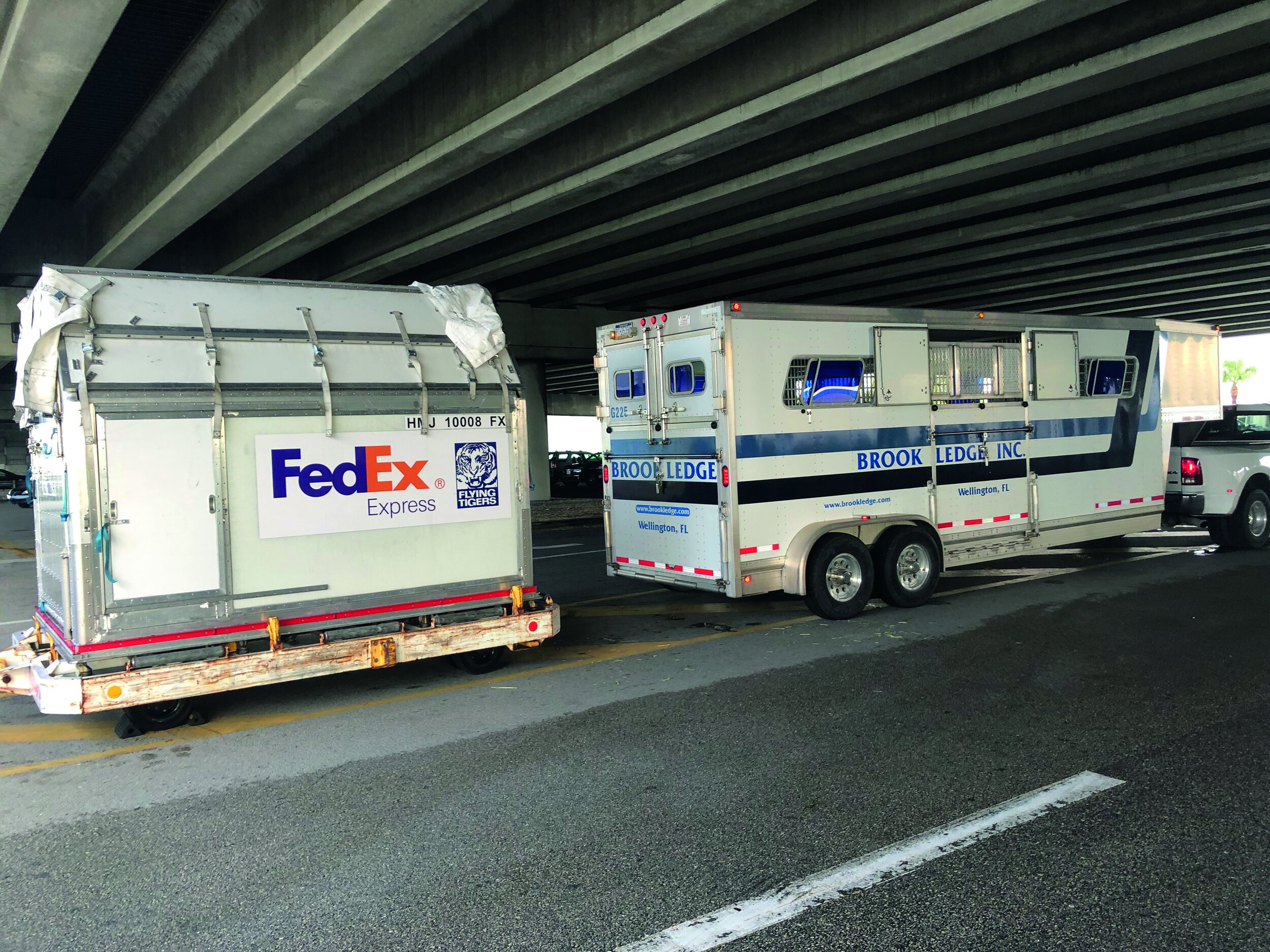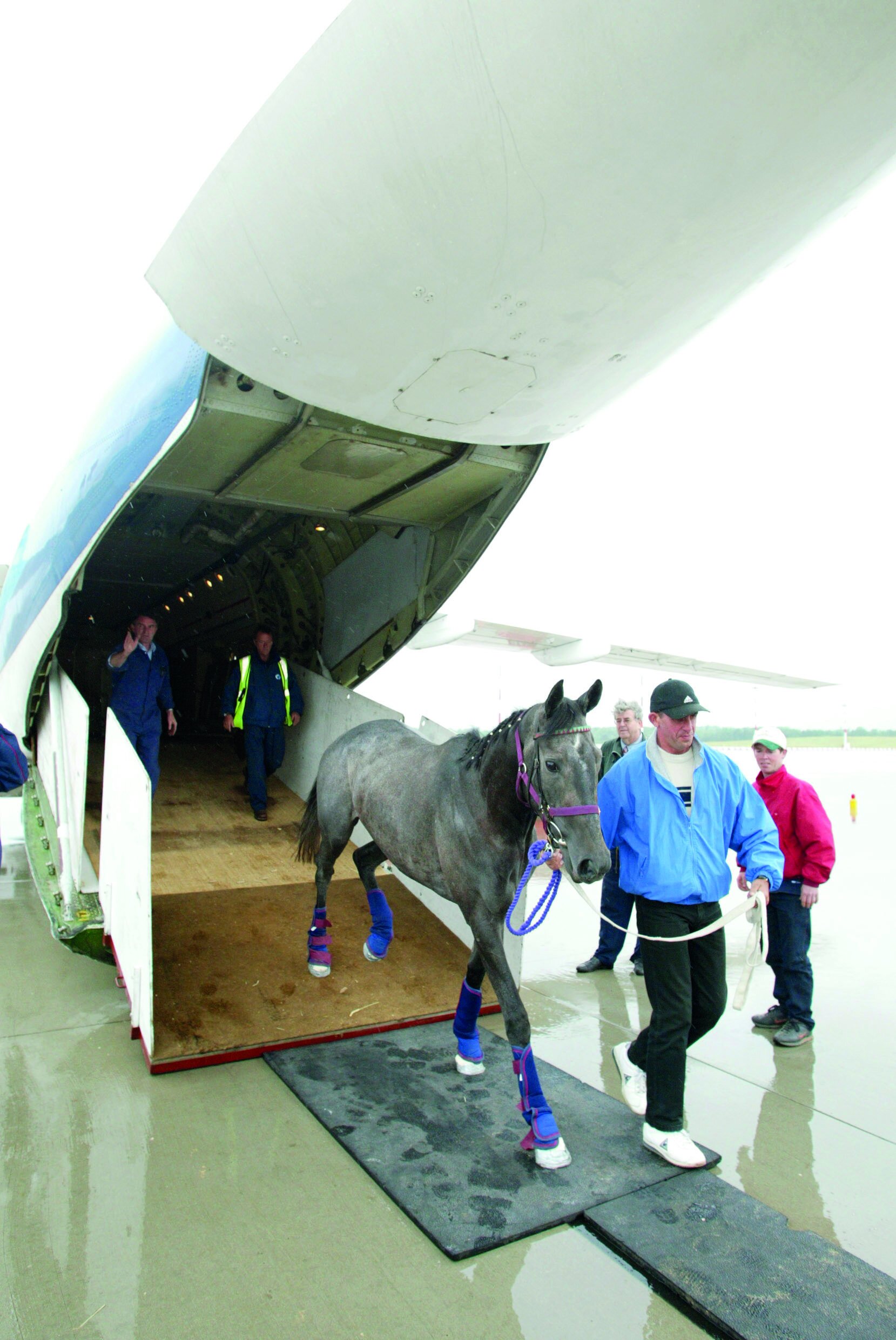International Travel
Traveling equines currently enjoy safer, more comfortable travels whether being hauled by truck or flying the friendly skies. However, due to unavoidable circumstances and worldwide government regulations, shipping companies, trainers and owners are road-weary and jet-lagged.
by Annie Lambert
Since terrorists attacked New York City on September 11, 2001, security measures on all forms of transportation have been stringent, especially for aircraft. The COVID-19 pandemic breaking out in late 2019 raised anxiety and stirred fears, adding even more government regulations to human and animal transport.
Whether you are shipping horses domestically across the United States, internationally to Europe and other far away destinations or between the European Union and Great Britain, nothing is easy. In fact, it has become a paper-heavy, logistical nightmare.
Four-Footed Freight
H.E. “Tex” Sutton worked around the racetrack at an assortment of jobs from a very young age. He began booking horses to ship on railcars in 1954, continuing until prohibitive costs caused him to venture into equine air transport. Tex died long ago, but Tex Sutton Equine Air Transportation is still operating.
In May 2021, the company was unable to renew the lease on their Boeing 727 (cleverly dubbed Air Horse One). After searching unsuccessfully for another aircraft for their equine charters, the strictly domestic company was obliged to book their clients with Federal Express. FedEx bought out one of the original equine freight haulers, Flying Tiger, in 1988.
Airlines all gave the company’s current owner, Rob Clark, the same excuse: They simply didn’t have any extra planes. Any and all aircraft were needed to ship freight. The pandemic had caused a backup in supply chains by truck, sea and air.
“We are still flying as busy as ever,” pointed out Greg Otteson, Sutton sales manager. “We are in between [charter] airplanes right now, so we’re operating using the FedEx system.”
Supply chain woes have scrambled equine transport around the world. Throughout the pandemic, fewer passenger flights caused the freight cargo, normally in the belly of those planes, to be routed to freight-only carriers. The demand for cargo space remains very high.
Kevin Needham
Kevin Needham, managing director of BBA Shipping & Transport Ltd in Newmarket, England, has not noticed any waning demand in shipping horses worldwide. He has experienced many challenges in getting horses from Point A to Point B.
“It’s a definite pandemic consequence,” Needham explained. “Before COVID, people flew around the world really quite regularly and freely in wide-bodied passenger jets. When you’re on an airplane, you sit on the top part of a massive cigar tube; the area below is for freight—full of cargo.”
“When people couldn’t travel, the passenger flights couldn’t travel, [and] the cargo that went in the bellies of those passenger flights got over to the freighter network,” he added. “Flying horses relies on the freighter network because we need the headroom that’s on the main deck. With the complete shutdown in the passenger network, all that freight is going to the freight network.
“Plus, a lot of freight was pulled out of circulation by ridiculous government contracts being paid millions of dollars to fly 50 tons of rubber gloves from China to San Diego, [for example]. They are not in the marketplace, so all the freight rates went up. So, while the numbers of horses stayed relatively stable, the routes they were traveling and the costs to the owners became considerably more expensive.”
Bus Route
Scarlette Gotwals, Brook Ledge
Brook Ledge Horse Transportation has been hauling equines around the United States for more than 55 years. Scarlette Gotwals, DVM, their operations manager, now oversees domestic and international air flights in addition to ground trucking via their wholly owned subsidiary, Horse America.
Brook Ledge Horse Transportation has been hauling Equines around the USA for 55 years
Brook Ledge began using FedEx in 2016. They ship an elite clientele, including many horses on the Kentucky Derby trail, often one or two horses at a time. Unless there are enough horses to charter an entire plane, the equines go where the plane goes, not the other way around. There are few, if any, direct flights.
“FedEx has a published route list,” Gotwals explained. “It is like a bus schedule; you can’t pick your time or route. You have to go when their schedule goes. For example, Tex Sutton [charters] could fly into Ocala Airfield, right next to Ocala Breeders’ Sale, but the closest FedEx [destination] is Orlando [80 miles away].”
These rigid schedules force equine transporters to be creative when planning travel. Finding trips with minimal highway trucking, pre- and post-flight, can be a challenge.
“If you want to go from Gulfstream [Florida] to Oaklawn Park [Arkansas] to run, you basically fly to Memphis, then truck the three hours down to Oaklawn,” Gotwals said. “If you want to go to Belmont [New York], the plane lands in Newark, New Jersey, [over 40 miles away].”
Canada has not reopened to U.S. flights post-pandemic as yet, so Gotwals pointed out horses first fly into airports near the border, then have an initial three-day quarantine, get Canadian papers and finish the trip by truck.
Otteson qualified that Tex Sutton horses going to Vancouver fly into Seattle; those heading to Calgary fly into Great Falls, Montana; and horses traveling to Toronto usually fly into Detroit or Buffalo.
The good news, according to Dr. Gotwals, is how improved ground-trucking horses has become. A lot more is known in keeping horses comfortable and healthy over long hauls. Brook Ledge has transported horses in box stalls from Ocala to California for a number of years.
“When air flights started,” the veterinarian remarked, “we were not as advanced as to how we handled horses on the trucks.” “We’ve learned a lot and there have been published studies. For example, horses do much better when they are loose in a box and able to put their heads down.”
Paperwork Chaos
James Luck
James Luck, the brother of NBC racing analyst Nick Luck, is a co-founder of LG Bloodstock along with partner Lucy Greayer in Berkshire, England. Luck identified a shortage of aircraft and fewer straight-through flights to the United States, but cited his biggest problems presently stem from inter-European travel. Great Britain’s break from the European Union created massive regulation and paperwork.
“With the UK no longer part of the EU, you can’t get anything done over here; it’s ten times as hard as it used to be,” Luck stated. “We have literally ten times as much paperwork as we used to have.
“At the moment, if we want to schedule horses on a flight to New York, we have to truck them from the UK to Liege, Belgium, for a flight to JFK. In the old days, that was a[n] EU paper, one piece of paper to get us to Belgium, and U.S. papers. We stable overnight in Belgium, and off we go. It is now a total of 64 pieces of paper to get that horse to Belgium.”
There are also border control posts and an extensive number of tariffs, taxes and fees when moving goods, including livestock, in and out of the UK. Some of these fees, depending on the owner’s status, would be refunded upon return—not to mention veterinary inspections. As Luck said, “The bureaucracy of the paperwork is unbelievable.”
The stacks of documentation required has doubled Luck’s staffing levels since BREXIT.
“The paperwork all this entails is mind-boggling,” he reiterated. “The bureaucracy and red tape has gone up 20-fold. It is making anyone’s job very, very difficult. And, if a horse gets to [the border check] and there is one digit wrong on one microchip number on 64 pieces of paper, the vet will send that horse home, back to the UK.”
Needham agrees with Luck’s contempt for the added paperwork.
“[BREXIT] made for more paperwork on the European end,” he acknowledged. “They started to treat the UK as if it were the U.S. or Canada. We’ve become a sort of foreign country as far as the EU is concerned.”
Flying Grooms
Needham also cited the COVI pandemic as a source for many of his shipping woes. Different governments panicked in different ways, many with differing restrictions. Equine handlers, called “flying grooms,” became stigmatized by nationality.
“There wasn’t a problem with the horses; it was the problem with the people accompanying the horses,” he noted. “We have this ridiculous situation where, if you have a U.S. passport, you can get into the U.S.; but if you had any other passport, obviously you were a COVID risk, because holding a piece of paper in your hand affects the way a virus can infect you.
“The freighters have to come over with U.S. grooms with the horses, and then the grooms go back to the states. It is a similar situation when flying horses to Hong Kong. Because Hong Kong is now a part of China, it has a zero COVID policy. Foreign people aren’t allowed in, even airline pilots, without two weeks in quarantine. The grooms have to go in on the plane, the horses get off, then the grooms come back out on the same plane they went in on.”
Needham mentioned that Korean International races have been lost because South Korea is another country that has gone with zero COVID regulations. He doesn’t hold much hope that international shipping will ever get back to the days when things were easier to organize.
“In Ireland, France and the UK, we’re racing quite normally and have been for a good while,” he said. “I think that situation is going to stabilize quite quickly. There were plenty of horses in the [2021] Breeders’ Cup. Getting horses to North America is no more complex than it was, and there is an appetite for it.”
Horses must fly in the accompaniment of FedEx-approved flying grooms. Getting approved is a lengthy, in-depth process. The airline requires a minimum of two grooms, whether you are shipping one horse or nine, according to Gotwals.
“The flight grooms that we use have been flying for probably 30 years and are professional handlers,” Gotwals said. “It is about a six- to eight-week process to have a flying groom approved. They have to have an expensive security threat assessment, which is a TSA high-level clearance with background and criminal checks. Unless you have a specific groom that is going to fly with horses three to four times a year, FedEx is not interested in getting them approved.”
Flight Plan
Horsemen and shipping companies continue to plow through paperwork, staff COVID testing and route changes. Other big hits to equine travel plans, however, are inflation and the rapidly rising fuel prices worldwide.
Gotwals opined that she couldn’t imagine it will be long before FedEx adds a fuel surcharge, especially if oil remains over $100 per barrel.
“Everybody is having to add surcharges,” she said. “A tractor-trailer gets five to five-and-a-half-miles to the gallon. When you start to increase prices by a dollar to three dollars a gallon, it means every five miles is an additional three dollars. It adds up very quickly.”
Luck has navigated the pandemic changes but now winces at the energy crisis enveloping Europe.
“The clients are being hit by another whammy, in that fuel prices are going through the roof,” Luck said. “It is literally costing me double to fill up my car. It’s the same with aircraft; it is costing a lot more to purchase aviation fuel. Therefore, it is costing a lot more to fly horses. We’ve recently been hit by every airline we use with substantial rate increases across the board.
Shipping companies seem to agree that demanding regulations and rising costs could somewhat chill equine movement. They also agree it is essential to Thoroughbred racing that equines remain mobile.
“We are a resilient industry,” Luck opined. “We’ve been through a lot of things. I remember after the terrible events of 9/11, we had horses stuck in the UK; it was an awful long time before we could get those horses going again. We’ve been through disease outbreaks and more. But fundamentally, horses will still need to be moved.”







